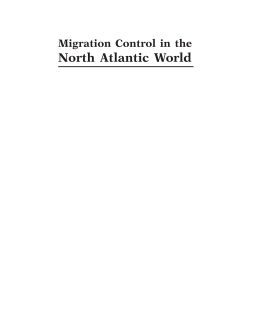
BOOK
Migration Control in the North-atlantic World
Andreas Fahrmeir | Olivier Faron | Patrick Weil
(2003)
Additional Information
Book Details
Abstract
The migration movements of the 20th century have led to an increased interest in similarly dramatic population changes in the preceding century. The contributors to this volume - legal scholars, sociologists, political scientist and historians - focus on migration control in the 19th century, concentrating on three areas in particular: the impact of the French Revolution on the development of modern citizenship laws and on the development of new forms of migration control in France and elsewhere; the theory and practice of migration control in various European states is examined, focusing on the control of paupers, emigrants and "ordinary" travelers as well as on the interrelationship between the different administrative levels - local, regional and national - at which migration control was exercised. Finally, on the development of migration control in two countries of immigration: the United States and France. Taken altogether, these essays demonstrate conclusively that the image of the 19th century as a liberal era during which migration was unaffected by state intervention is untenable and in serious need of revision.
Patrick Weil is Director of Research at CNRS in the Centre for Research on the History of Social Movements and Trade Unionism, Paris I - Sorbonne. He is the author of a report for the French Prime Minister on French nationality and immigration law in 1997 and is a member of the French Consultative Commission on Human Rights.
Olivier Faron is a researcher at the CNRS, Université Paris and lecturer at the Institut d'Etudes Politiques de Paris. He is secretary general of the Société de Démographie Historique and deputy secretary general of the Société Française d'Histoire Urbaine.
“…we still know surprisingly little about the enforcement of [national migration control laws] and their effects on migration…This book significantly reduces our ignorance…astonishingly, most of the papers…manage to thread a path through the formidable tangle of law, jurisdictions and complexities while maintaining a clear narrative voice and not losing sight of the larger issues.” · Comparativ
In general, this set of essays, in its breadth of contributions and range of topics, is a major value to specialists and advanced students. The essays are argued tightly, et rest on a substantial base of evidence. · History: Reviews of New Books
"[A] pioneering study ... As well as its empirical strengths, the book also demonstrates Fahrmeir's comfort in dealing with theory ... The rigor with which [he] tackles his subject deserves comment ... A genuine comparative history ... an extremely important monograph ... a major contribution to out understanding of the legal position of aliens in modern European history." · American Historical Review
Andreas Fahrmeir is currently in the History Department at the University of Cologne.
Table of Contents
| Section Title | Page | Action | Price |
|---|---|---|---|
| Migration Control in the North Atlantic World | iii | ||
| Copyright Page | iv | ||
| Contents | v | ||
| List of Illustrations | vii | ||
| Acknowledgements | viii | ||
| Notes on Contributors | ix | ||
| Introduction | 1 | ||
| Part 1. Beyond the French Revolution | 9 | ||
| Chapter 1. The Eighteenth-Century Citizenship Revolution in France | 11 | ||
| Chapter 2. ‘African Citizens’ | 25 | ||
| Chapter 3. Paris and its Foreigners in the Late Eighteenth Century | 39 | ||
| Chapter 4. British Nationality Policy as a Counter-Revolutionary Strategy During the Napoleonic Wars | 55 | ||
| Part II. An Age of Experimentation | 71 | ||
| Chapter 5. Passports and the Development of Immigration Controls in the North Atlantic World During the Long Nineteenth Century | 73 | ||
| Chapter 6. ‘Beggars appear everywhere!’ | 92 | ||
| Chapter 7. Qualitative Migration Controls in the Antebellum United States | 106 | ||
| Chapter 8. The Transformation of Nineteenth-Century West European Expulsion Policy, 1880–1914 | 120 | ||
| Chapter 9. Foreigners and the Law in Nineteenth-Century Austria | 138 | ||
| Chapter 10. Empowerment and Control | 153 | ||
| Chapter 11. Was the Nineteenth Century a Golden Age for Immigrants? | 167 | ||
| Chapter 12. Revolutionaries into Beggars | 178 | ||
| Part III. New Determinants of Migration Control | 193 | ||
| Chapter 13. The Archaeology of ‘Remote Control’ | 195 | ||
| Chapter 14. Hamburg and the Transit of East European Emigrants | 223 | ||
| Chapter 15. Labour Unions and the Nationalisation of Immigration Restriction in the United States,1880–1924 | 237 | ||
| Chapter 16. Between Altruism and Self-Interest | 253 | ||
| Chapter 17. Races at the Gate | 271 | ||
| Part IV. Provisional Conclusions | 299 | ||
| Chapter 18. Law and Practice | 301 | ||
| Index | 317 |
